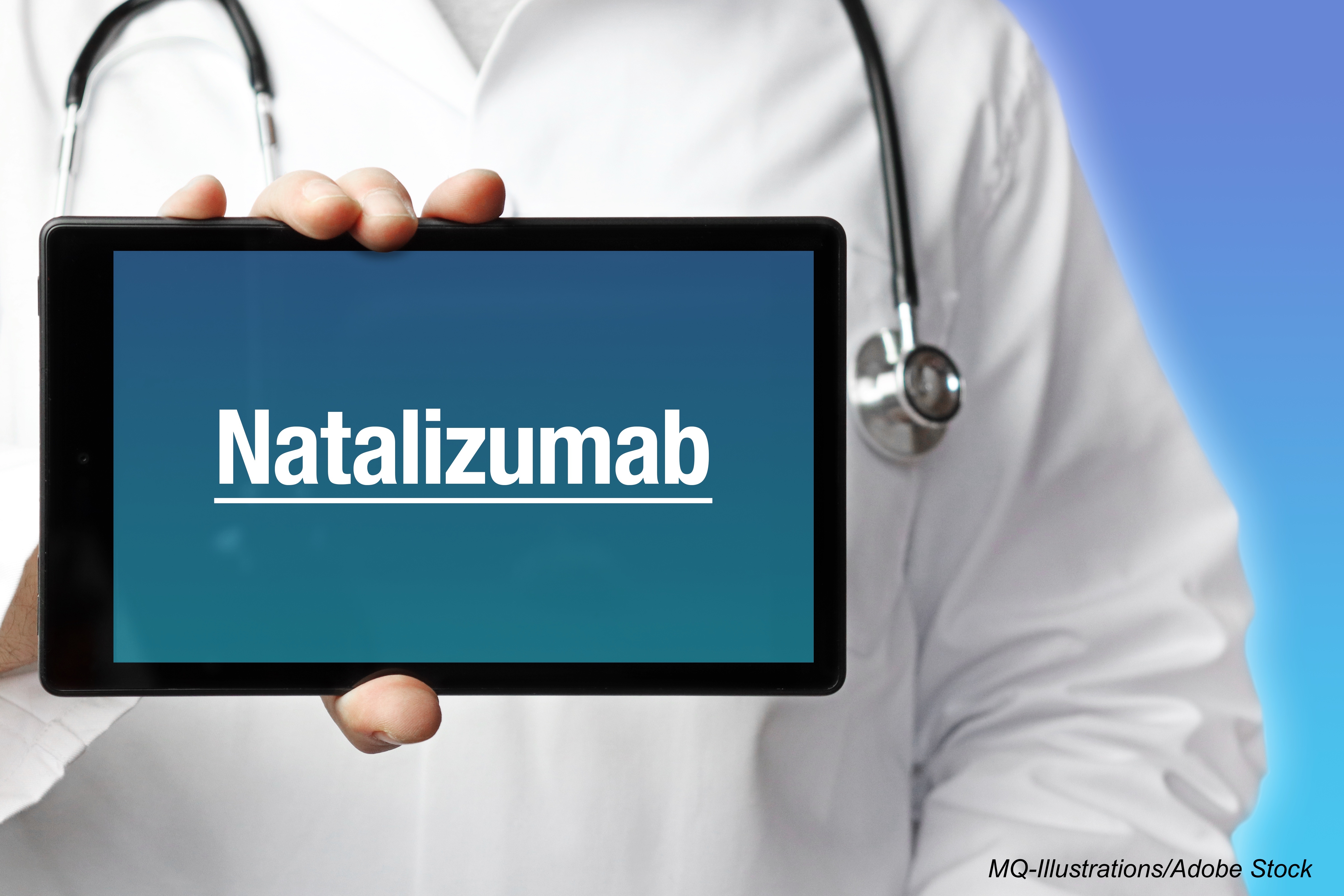Infusions of the disease-modifying therapy natalizumab—given every 6 weeks instead of the approved 4-week dosing schedule—proved to be efficacious in controlling multiple sclerosis (MS) disease activity, according to newly released data from the extended dosing NOVA study.
Time to first relapse was similar between the two dosing groups, and a similar percentage of patients in the two groups were relapse-free at 72 weeks (6-week dosing, 96.9%; 4-week dosing, 97.6%).
The latest data from the prospective, randomized phase IIIb NOVA trial were presented this week at the 37th Congress of the European Committee for Treatment and Research in Multiple Sclerosis–ECTRIMS 2021.
The study enrolled 499 patients with relapsing remitting MS whose disease was stable after at least one year on the 4-week, standard 300-mg dosing schedule of natalizumab prior to randomization. The primary endpoint was number of new and enlarging lesions at week 72.
Neurologist John Foley, MD, of Salt Lake City, Utah’s Rocky Mountain MS Clinic, presented the findings by video at the virtual ECTRIMS 2021 meeting, held Oct. 13-15.
“Overall, conclusions suggest that the vast majority of patients on both the Q4 week and Q6 week dosing of natalizumab are able to maintain a high level of efficacy, and that the vast majority of patients who are stable on natalizumab at a Q4-week dosing interval can switch to Q6-weeks without a meaningful loss of efficacy,” Foley said.
He noted that the number of new lesions seen in both dosing groups was slightly below the expected number based on prior studies of patients on the disease modifying therapy. A total of 4.1% of patients on the 4-week dosing schedule showed evidence of new or enlarging lesions during the study, compared to 4.3% on the 6-week dosing schedule.
Treatment with natalizumab is associated with an increased risk for the rare viral brain infection leukoencephalopathy, as well as other side effects. Preliminary research suggests that extending the drug’s dosing schedule may lower the risk for these adverse events.
Real-world data also presented at ECTRIMS 2021 found MS patients treated with natalizumab to have a significantly lower relapse risk than patients treated with ocrelizumab.
The retrospective analysis of outcomes among patients with relapsing remitting MS treated with the disease modifying therapies involved data on patients treated from April 2017 through September 2020 from a large U.S. claims database.
All patients included in the study had at least one in-patient or two out-patient relapse-related claims in the year prior to enrollment, were naive to study treatments in the year prior to the initial prescription (index date) and were treated with either natalizumab or ocrelizumab during the study period.
Neurologist Jacqueline Nicholas, MD, of OhioHealth MS Center, presented the data by video at the virtual ECTRIMS 2021 conference.
The main study outcome was comparison of time to any relapse event assessed using Kaplan-Meier analysis, and the study included 3,497 patients treated with ocrelizumab and 835 patients treated with natalizumab.
Among the study population, 48% of natalizumab-initiating patients and 47% of ocrelizumab-initiating patients experienced one or more relapses in the year prior to starting therapy.
The cumulative probability of any relapse at 12- and 24-months was significantly lower in patients treated with natalizumab compared to ocrelizumab (0.83 vs 0.76, respectively, at 12 months, 0.70 vs 0.64 at 24 months; both P<0.001).
“Hazard ratios for time to relapse as well as mean annualized relapse rates for any relapse and outpatient relapse also favored natalizumab over ocrelizumab,” Nicholas said.
The mean annualized relapse rate in patients treated with natalizumab was 0.30 compared to 0.43 among ocrelizumab-treated patients (mean difference, −0.13; P=0.02), while the mean relapse rates were 0.22 and 0.36 (mean difference, −0.14; P=0.01).
Differences in annualized rates of MS-related ER visits or relapse-related hospitalizations did not differ significantly between the two treatment groups, and mean annualized costs associated with any relapse, outpatient relapse, hospitalized relapse or total steroid use were also similar in the natalizumab- and ocrelizumab-treatment groups.
However, Nicholas cautioned that cost estimates were limited by the relatively few relapse events during the analyzed period associated with a wide range of costs.
“Patients treated with natalizumab (in this analysis) had significantly lower risk and hazard for time to first relapse and lower annualized relapse rates compared to ocrelizumab-treated patients,” Nicholas said. “These results may provide useful information for health care professional considering high-efficacy treatment options for their patients with relapsing forms of multiple sclerosis.”
-
Infusions of the disease-modifying therapy natalizumab given every 6 weeks instead of the approved 4-week dosing schedule proved to be efficacious in controlling multiple sclerosis disease activity.
-
MS patients treated with natalizumab had significantly lower relapse risk than patients treated with ocrelizumab in a real-world analysis of claims-based data.
Salynn Boyles, Contributing Writer, BreakingMED™
The NOVA and real-world natalizumab/ocrelizumab comparison studies were funded by Biogen Inc.
NOVA researcher Foley reported receiving consulting fees from Biogen, Genentech, Genzyme and Teva Pharmaceuticals. Other researchers also reported receiving consulting, speaking fees from Biogen and other pharmaceutical companies.
Nicholas reported receiving research grants from Adamas, Biogen, Genzyme, aqnd Novartis and receiving consulting and/or speaking fees from Alexion, Bristol Myers Squibb, EMD Serno, Genentech, Greenwich Biosciences and Novartis. Several study researchers were employed by Biogen.
Biogen also provided funding for editorial support in development of this poster, and provided feedback on the poster to the authors.
Cat ID: 708
Topic ID: 98,708,730,130,36,192,925,708


